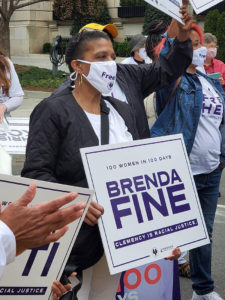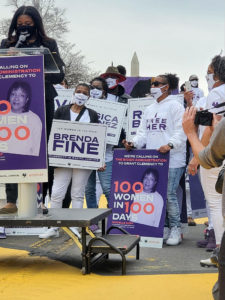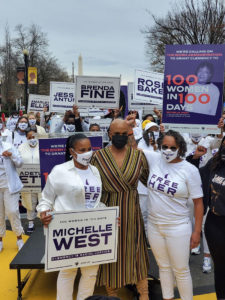 The pandemic hit hard and restricted our travels, so I have not had the opportunity to travel and report on criminal justice reform issues since early 2020. This was my first time visiting Washington D.C. and I was proud to be doing it in a capacity to advocate for incarcerated women’s release from prison.
The pandemic hit hard and restricted our travels, so I have not had the opportunity to travel and report on criminal justice reform issues since early 2020. This was my first time visiting Washington D.C. and I was proud to be doing it in a capacity to advocate for incarcerated women’s release from prison.
There are over 200,00 women incarcerated in prisons across the United States. The United States incarcerates1 more people than any other country in the world.
 On March 12th, I traveled to DC to participate in a campaign with The National Council for Women and Girls to ask President Biden to release 100 women with his executive power of clemency in his first 100 days in office.
On March 12th, I traveled to DC to participate in a campaign with The National Council for Women and Girls to ask President Biden to release 100 women with his executive power of clemency in his first 100 days in office.
Democratic Rep. Cori Bush, of Missouri, and Rep. Ayanna Pressley, of Massachusetts, were present to support this initiative and add their voices to the platform. Pressley stated in her speech “ …intersection of policy and Black liberation is more than symbolic. It is the intentional decision to follow the lead of our foremothers. [Biden] can grant clemency to the 100 women by the stroke of a pen. When this country incarcerates Black women, their entire family suffers, which causes intergenerational trauma and hurts communities.” She has also reintroduced The People’s Justice Guarantee2, which aims to beat mass incarceration while working to make the criminal legal system more equitable. This was introduced in 2019 and is being re-addressed now as the House is passing other criminal justice and police reform legislation.3
 Cori Bush also spoke very powerful words stating “Every mother that is arrested and every unfair arrest maintains a locked-in-cycle of trauma that will continue for another generation.” She acknowledged that thousands of children are separated from their families by the criminal justice system.
Cori Bush also spoke very powerful words stating “Every mother that is arrested and every unfair arrest maintains a locked-in-cycle of trauma that will continue for another generation.” She acknowledged that thousands of children are separated from their families by the criminal justice system.
There were over 100 women who attended the rally, most of whom were formerly incarcerated or impacted by the criminal justice system. I reunited with several women who were in Bedford Hills Correctional facility with me such as Donna Hylton, who started a non for profit organization called “A Little Piece of Light”, Colby Anderson, Kay Wilson, Tracy Lang and Athena Stripling. It was a wonderful experience being with these women who are fighting for our incarcerated sisters.
The U.S. Constitution allows the President the power to grant clemency for a person who committed a federal crime. This can be a commutation, which reduces a person’s sentence, or a pardon, which absolves them of the crime. Draconian penalties and mandatory minimum sentence statutes dictated the country’s “War on Drugs”, as well as the 1994 crime bill4 that targeted low-level dealers who were mostly from black and brown communities with conspiracy charges in drug trafficking. Many people who were charged have never seen or touched drugs but were charged with conspiracy.
 While in the Senate, Biden authored and supported many of these tough-on-crime bills that have had a direct impact on Black communities and increased the prison population. He has since offered criminal justice reforms that counter some of that earlier legislation. In Biden’s current/Presidential criminal justice plans, he pledged to help end mass incarceration in the United States by using his power to grant clemency.
While in the Senate, Biden authored and supported many of these tough-on-crime bills that have had a direct impact on Black communities and increased the prison population. He has since offered criminal justice reforms that counter some of that earlier legislation. In Biden’s current/Presidential criminal justice plans, he pledged to help end mass incarceration in the United States by using his power to grant clemency.
The U.S. Department of Justice publishes clemency statistics5 going back to the presidency of Teddy Roosevelt in the 1900s. The numbers from recent years show that George W. Bush pardoned 189 people and commuted 11 sentences. Obama, who encouraged people to file petitions during his administration’s clemency initiative, granted 212 pardons and commuted the sentences of 1,715 people. President Donald Trump, who largely bypassed the traditional Justice Department process for some of his clemency decisions, granted 143 pardons and commuted 94 sentences during his presidency. The Justice Department also shows, at last count, nearly 400 clemency petitions asking for President Biden to pardon or commute sentences have been filed. He has not granted a clemency petition yet.6
 As a formerly incarcerated woman and mother, I know all too well the collateral consequence of mass incarceration on the family. Since coming home, I have faced many obstacles in my relationships with my daughter, siblings, colleges, and intimate relationships. I have to relearn everything because prison is a different world with different sets of rules for engaging with others. I am learning to take my power back and develop new social skills that were non-existent behind prison walls.
As a formerly incarcerated woman and mother, I know all too well the collateral consequence of mass incarceration on the family. Since coming home, I have faced many obstacles in my relationships with my daughter, siblings, colleges, and intimate relationships. I have to relearn everything because prison is a different world with different sets of rules for engaging with others. I am learning to take my power back and develop new social skills that were non-existent behind prison walls.
I will continue to fight for the freedom of all women and girls. No one is free until we all are free! #FREEHER. #UntilTheViolenceStops
I ask that anyone who is moved by the mass incarceration of women and girls connect with the National Council or donate to the plight. You can contact me at roz (at) vday.org for ways in which you can join campaigns and be a part of changing history for women and girls impacted by the criminal justice system.

1 “States of Incarceration: The Global Context 2018” (Prison Policy Initative, June 2018, Peter Wagner and Wendy Sawyer)
2 Rep. Pressley Launches A Bold, Progressive Criminal Legal Reform Resolution: The People’s Justice Guarantee, (Press Release, 2019 November 14, Ayanna Pressley)
3 “We must act now: House passes police reform bill named for George Floyd” (USA Today, 3 March 2021, Savannah Behrmann and Jeanine Santucci
4 “Joe Biden’s Controversial 1994 Crime Bill, Explained” (Vox, 29 September 202, German Lopez)
5 “Clemency Statistics” (U.S. Department of Justice)
6 “Pardons Granted by Joseph R. Biden” (U.S. Department of Justice)